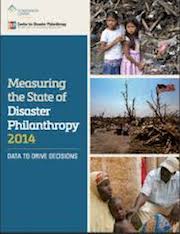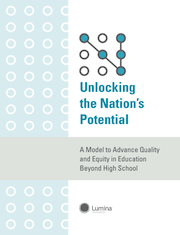Site Search
- resource provided by the Forum Network Knowledgebase.
Search Tip: Search with " " to find exact matches.

Measuring the State of Disaster Philanthropy 2014: Data to Drive Decisions is the most comprehensive analysis to date on disaster-focused philanthropy. Published by Foundation Center and the Center for Disaster Philanthropy, the report provides a snapshot of funding for disasters by the largest U.S. foundations. This analysis focuses on 2012 data to establish a baseline and is the beginning of a longer- term effort to collect and aggregate data—from multiple streams—in order to track disaster giving globally. As these data collection efforts move forward, subsequent reports will feature more current and comprehensive trends on disaster-related giving.
Learn about a new report on the care economy narrative change landscape in the U.S. supported by the Care for All with Respect and Equity (CARE) Fund and developed by Asset Funders Network, Economic Opportunity Funders, Early Childhood Funders Collaborative, Grantmakers In Aging, Grantmakers In Health, and Disability & Philanthropy Forum.
Coming together for the first time across issues and constituencies represented by this diverse range of PSOs, the discussion will center the evolving landscape of narrative change efforts across the care economy, lessons being learned by practitioners and by funders, and potential opportunities for further learning and action.
Cost: Free for Members and Non Members
In March 2024, Governor Murphy signed into law significant reforms to the ways that New Jersey enforces municipal affordable housing obligations under the state Supreme Court Mount Laurel doctrine. The new law creates enhanced affordable housing opportunities for New Jersey’s low-and moderate-income households, while seeking to streamline the affordable housing development process by setting clear guidelines for determining housing obligations. It is expected to reduce legal costs and judicial involvement. Join Adam Gordon, Executive Director and Emily Devenney, Grants and Development Manager of the Fair Share Housing Center for a conversation about what this new legislation means for philanthropy.
Since the revival and improved enforcement of the Mount Laurel Doctrine in 2015, New Jersey has seen a considerable increase in affordable housing production. However, there remains a substantial shortage of affordable homes in the state, particularly for very low-income residents. The legislation aims to address this gap by ensuring that every municipality contributes its fair share of affordable housing.
Key features of the legislation include a streamlined process for determining affordable housing obligations, codification of methodology for calculating these obligations, increased transparency in the housing development process, and the repeal of the state Council on Affordable Housing (COAH). Additionally, the legislation prohibits wealthy towns from avoiding their housing obligations through regional contribution agreements.
Cost: Free for CNJG Members; $50 for Non Member Grantmakers
Adam Gordon is the Executive Director of FSHC and leads FSHC’s coordinated strategy of organizing, litigation, and policy development to advance racial, economic, and social integration throughout New Jersey and the United States. Since joining the organization in 2006, he has worked to implement the Mount Laurel Doctrine which has created over 70,000 affordable homes in historically exclusionary NJ communities, litigated the largest federal fair housing case in American history, and worked to make federal disaster recovery policy more equitable. Under his leadership FSHC has secured the passage of the first statewide Fair Chance in Housing Act to limit discriminatory tenant screening policies and a landmark $305 million fund to accelerate affordable housing development. Gordon holds a B.A. and J.D. from Yale University.
Emily Devenney joined Fair Share Housing Center as the Grants & Development Manager in January 2024. She comes with experience in fundraising and community organizing, and strong connections to South Jersey, where she was born and raised (and likely will never leave). Emily has a B.A. in Economics and a Masters of Public Policy from the University of Massachusetts Amherst and a Certificate in Fundraising from Villanova University.
Webinar Video
Foundation leaders have a unique opportunity to serve as powerful champions of their missions. Partnering with your grantees can amplify your impact. The following guide is designed to help you start having an honest conversation in the boardroom; a conversation about your foundation’s goals, approach, and, most importantly, vision for the future.
Adopted by CNJG”s Board of Trustees in October 2023, these eight Principles offer philanthropy a source of direction for their own equity journey. Each principle begins with a common understanding followed by developmental steps, and the aspiration for each principle. These principles are intended to promote continuous learning, vulnerability, and reflection for how philanthropy can evolve from its historical roots to a more trusting, accountable, and equitable model.
Sample bylaws for Community Foundations.
The Grantmaker Salary and Benefits (GSB) Report is the philanthropic sector's leading source of comprehensive data on U.S. foundation staff, helping organizations of all sizes craft budgets, recruit and retain talent, and set personnel policies. The 2024 GSB Report features salary data for 11,380 full-time staff across 1,006 grantmaking organizations. It includes benchmarking data for 38 distinct positions, staff tenure insights such as departure and turnover rates, demographic information, and more.
If you participated in the 2024 Grantmaker Salary and Benefits Survey, you can access the Council on Foundations’ benchmarking tool on Benchmark Central to run salary, benefits, and demographics comparisons by asset size, grants, geographic location, and grantmaker type.
Members of the Council on Foundations can access the report for free; nonmember price is $549.

A report from Lumina Foundation and its Quality Credentials Task Force calls for a coordinated national effort to ensure equitable access to quality postsecondary education in the United States.
The report, Unlocking the Nation's Potential: A Model to Advance Quality and Equity in Education Beyond High School (32 pages, PDF), found that the current U.S. system of degrees, certificates, industry certifications, and other credentials lacks a comprehensive definition of quality as well as the kind of up-to-date indicators needed to drive improvements in policies and practices. To help guide efforts that ensure access to high-quality educational opportunities for students of color and advance racially and economically just outcomes, the task force — which includes nearly two dozen education, policy, and workforce development leaders — proposes a model based on a shared understanding of what a quality credential is, as well as institution-based curricular changes and systemic reforms at the federal and state levels.
